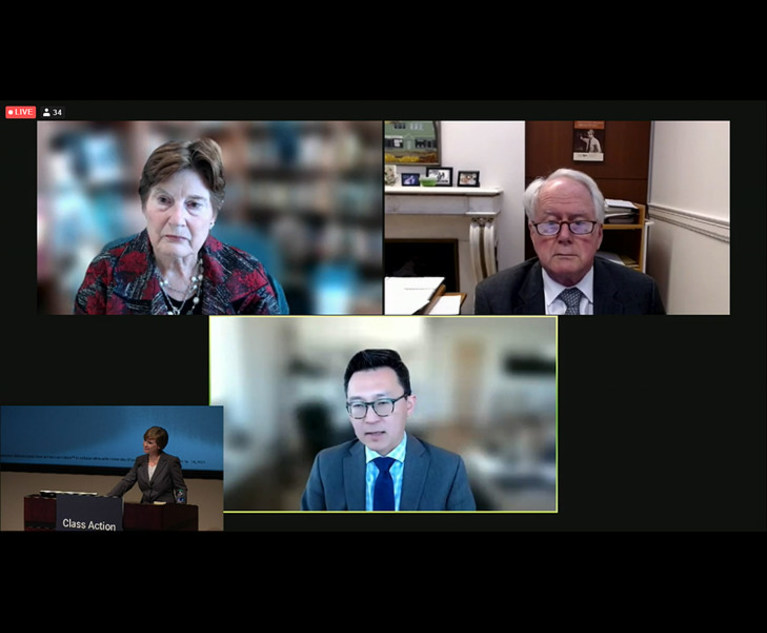 (l-r) The 9th Circuit Judicial Roundtable was moderated by Rebecca Church, Immediate Past President for Federal Bar Association, SD AUSA Chapter and featured Senior U.S. Circuit Judge William Fletcher and U.S. Circuit Judge Kenneth Lee, and U.S. Circuit Judge M. Margaret McKeown, all of the Ninth Circuit, during the Class Action Law Forum sponsored by Western Alliance Bank and hosted by University of San Diego School of Law. Image via streaming video
(l-r) The 9th Circuit Judicial Roundtable was moderated by Rebecca Church, Immediate Past President for Federal Bar Association, SD AUSA Chapter and featured Senior U.S. Circuit Judge William Fletcher and U.S. Circuit Judge Kenneth Lee, and U.S. Circuit Judge M. Margaret McKeown, all of the Ninth Circuit, during the Class Action Law Forum sponsored by Western Alliance Bank and hosted by University of San Diego School of Law. Image via streaming video A Rare View From Either Side of a Divided Appellate Panel That's Been Flipped by the Supreme Court
Ninth Circuit Judge M. Margaret McKeown and her colleague Senior Circuit Judge William Fletcher on Wednesday discussed the Supreme Court's TransUnion v. Ramirez decision, which reversed a decision where Fletcher was in the majority and McKeown dissented.
March 17, 2022 at 07:30 AM
4 minute read
One could hardly blame Ninth Circuit Judge M. Margaret McKeown if she wanted to take a victory lap.
She, after all, wrote the dissent in 2020 when two of her colleagues affirmed a jury verdict of more than $60 million against credit agency TransUnion in a case brought under the Fair Credit Reporting Act on behalf of a class of consumers whose names were flagged as matching those on a federal list of terrorists, drug traffickers or other serious criminals. The U.S. Supreme Court last year in TransUnion v. Ramirez reversed the Ninth Circuit majority, clarifying and driving home the point that "no concrete harm" means "no standing."
This content has been archived. It is available through our partners, LexisNexis® and Bloomberg Law.
To view this content, please continue to their sites.
Not a Lexis Subscriber?
Subscribe Now
Not a Bloomberg Law Subscriber?
Subscribe Now
NOT FOR REPRINT
© 2025 ALM Global, LLC, All Rights Reserved. Request academic re-use from www.copyright.com. All other uses, submit a request to [email protected]. For more information visit Asset & Logo Licensing.
You Might Like
View All
Litigators of the Week: The Eighth Circuit Knocks Out a $564M Verdict Against BMO in Ponzi Case

Litigators of the Week: Second Circuit Tells Argentina to Turn Over More Than $300M to Bondholders

How One of the World's Largest Institutional Investors Approaches Litigation

Big Law and Litigation Finance Seem to Be Having a Moment
Trending Stories
- 1Decision of the Day: Judge Dismisses Defamation Suit by New York Philharmonic Oboist Accused of Sexual Misconduct
- 2California Court Denies Apple's Motion to Strike Allegations in Gender Bias Class Action
- 3US DOJ Threatens to Prosecute Local Officials Who Don't Aid Immigration Enforcement
- 4Kirkland Is Entering a New Market. Will Its Rates Get a Warm Welcome?
- 5African Law Firm Investigated Over ‘AI-Generated’ Case References
Who Got The Work
J. Brugh Lower of Gibbons has entered an appearance for industrial equipment supplier Devco Corporation in a pending trademark infringement lawsuit. The suit, accusing the defendant of selling knock-off Graco products, was filed Dec. 18 in New Jersey District Court by Rivkin Radler on behalf of Graco Inc. and Graco Minnesota. The case, assigned to U.S. District Judge Zahid N. Quraishi, is 3:24-cv-11294, Graco Inc. et al v. Devco Corporation.
Who Got The Work
Rebecca Maller-Stein and Kent A. Yalowitz of Arnold & Porter Kaye Scholer have entered their appearances for Hanaco Venture Capital and its executives, Lior Prosor and David Frankel, in a pending securities lawsuit. The action, filed on Dec. 24 in New York Southern District Court by Zell, Aron & Co. on behalf of Goldeneye Advisors, accuses the defendants of negligently and fraudulently managing the plaintiff's $1 million investment. The case, assigned to U.S. District Judge Vernon S. Broderick, is 1:24-cv-09918, Goldeneye Advisors, LLC v. Hanaco Venture Capital, Ltd. et al.
Who Got The Work
Attorneys from A&O Shearman has stepped in as defense counsel for Toronto-Dominion Bank and other defendants in a pending securities class action. The suit, filed Dec. 11 in New York Southern District Court by Bleichmar Fonti & Auld, accuses the defendants of concealing the bank's 'pervasive' deficiencies in regards to its compliance with the Bank Secrecy Act and the quality of its anti-money laundering controls. The case, assigned to U.S. District Judge Arun Subramanian, is 1:24-cv-09445, Gonzalez v. The Toronto-Dominion Bank et al.
Who Got The Work
Crown Castle International, a Pennsylvania company providing shared communications infrastructure, has turned to Luke D. Wolf of Gordon Rees Scully Mansukhani to fend off a pending breach-of-contract lawsuit. The court action, filed Nov. 25 in Michigan Eastern District Court by Hooper Hathaway PC on behalf of The Town Residences LLC, accuses Crown Castle of failing to transfer approximately $30,000 in utility payments from T-Mobile in breach of a roof-top lease and assignment agreement. The case, assigned to U.S. District Judge Susan K. Declercq, is 2:24-cv-13131, The Town Residences LLC v. T-Mobile US, Inc. et al.
Who Got The Work
Wilfred P. Coronato and Daniel M. Schwartz of McCarter & English have stepped in as defense counsel to Electrolux Home Products Inc. in a pending product liability lawsuit. The court action, filed Nov. 26 in New York Eastern District Court by Poulos Lopiccolo PC and Nagel Rice LLP on behalf of David Stern, alleges that the defendant's refrigerators’ drawers and shelving repeatedly break and fall apart within months after purchase. The case, assigned to U.S. District Judge Joan M. Azrack, is 2:24-cv-08204, Stern v. Electrolux Home Products, Inc.
Featured Firms
Law Offices of Gary Martin Hays & Associates, P.C.
(470) 294-1674
Law Offices of Mark E. Salomone
(857) 444-6468
Smith & Hassler
(713) 739-1250






